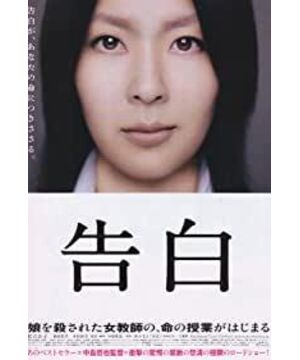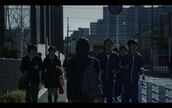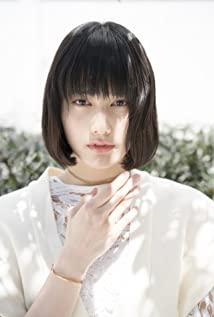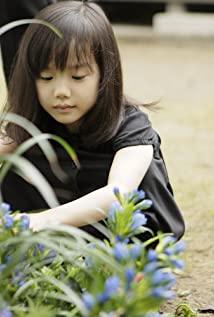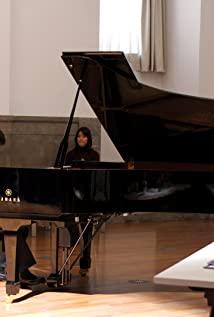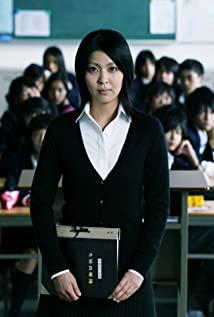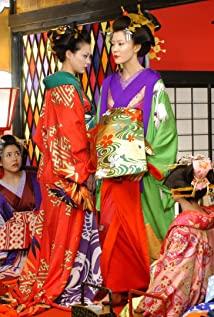Director Tetsuya Nakajima was born in commercials. In his "Confession", he gave full play to the "creative" ability of the film, showing a poetic truth. Isn't "poetry" something imaginary and ethereal? What does it have to do with reality? Indeed, the poetic "creation" language of "Confession" does not describe the "truth" in the eyes and ears, but it hits the truth of the heart. The unnatural sky that appears again and again, the speed and color of flowing clouds, will never look like that to our naked eyes, but it is precisely the true reflection in our hearts, turbulent, gloomy, confused, murderous; Nature will not change color for the injustice of the world, even if the black smoke from the crematorium in Ozwitz, its background can still be the bright sun and green trees. However, the poetic "creation" language of films has produced a real "heaven" belonging to "people" with emotions and good and evil. Tetsu Nakajima also makes good use of slow playback in "Confession", everything is more textured because it is magnified by time. The physical time that passes objectively and homogeneously exists only when we look at the hands of the watch or turn over the calendar of the grandstand. More relevant is the psychological time that we experience all the time. This "slow" is exactly in line with the rhythm when we want to lean over to inspect, lick the injured, and the strange life. "Confession" is full of realities of symbolic and metaphorical meanings. Mizuki is the black angel in the night who went to see Xiuya under the bridge; the silhouettes of the dusk, the roof, the sky, and the boy are frozen in the confusion that belongs only to youth; cast from the seemingly peaceful and warm white window of Naoki's house The plate that came out, mixed with smashed window glass, slammed into the hard road, and made a sound like the end of the day, which is a heart that was forced to madness and shattered to the ground... The movie is actually a heart mark.
On the face of it, this is a brilliant, breathtaking story of successful revenge. What can the unfortunate mother (Yuko) do to the murderer who killed her innocent daughter without any remorse and with criminal immunity due to her young age? When her "private" heart can't work with the "public" law, due to a preset "14-year-old timeline" (she doesn't think that one second before her 14th birthday is not someone who is capable of taking responsibility for her actions , the next second is enough; different individuals mature at the same moment when they are 14 years old.), and forgive their "sins", the daughter's innocent death and her own loss can not be compensated and comforted, how can she manage? The idea of holding the murderer together and perishing must have been there. But she found a way in which she could be safe and put her murderer to death. Instead of inserting a real dagger into the opponent's heart, he fabricated an invisible but equally sharp dagger that could penetrate the opponent's heart. It was falsely claimed that HIV-infected blood was injected into the milk of the two murderers' children, and the lives of both of them were affixed with a time limit of 5 to 10 years. Let the imminent death crush them. Because she understands that the structure that generates the gnawing fear and retains its strongest torment is to move from the future to the present, to come and not to come. There is no better way to experience the preciousness of life and the most intense pain and despair than when life is about to be deprived; at the same time, she took advantage of people's ignorant fear of HIV to completely isolate the two murderer children; Ethics court, put them on trial.
Sure enough, one of the children (Naoki), unable to bear the fear of "checkmate", fell into madness. No first kiss, still a virgin, life is inherently beautiful, and it will come to an abrupt end before he can taste it, he can't accept it.
But the other child (Xu Zai) was indifferent to "checkmate", and even secretly rejoiced. Life, even his own life, seemed weightless to him, even just a bargaining chip for him to exchange for the attention of his mother who had abandoned him. For this "suicide" child, the threat of AIDS does not work. She set off her classmates to blame him for the morality of the "murderer" and bullied him in the name of "justice". There was only one girl in the class (Mizuki) who didn't join in the carnival of his trial, and there was never a ferocious look on his face that was incompatible with childishness. It's because she alone understands that maybe everyone actually has a "murderer" hidden in their hearts, which doesn't match what Jesus said in the Gospels, "Whoever is without sin among you can stone her first. "The conditions of absolute innocence needed to discipline others? The "stone" made him bleed, but not fatally. Moreover, for Yuuko, even if he took his life, he would use a homemade bomb to ironically, play with life, and fight for a man who seemed to be willing to sacrifice his life, didn't know what life was, and was about to make a declaration of "cherishing life". The person who is about to create the feat of blooming blood flowers in the entire venue, and who will be excited by "immortality" himself, cannot achieve revenge in the true sense, because he has not taken away his love. But Yuuko still found his dead end. He may not be completely ignorant about life, at least, there is one person's life that has weight on him, leaving him only a paranoid expectation and a resolute back mother. Everything he did was just for a sure tender turn of hers. Yuuko once again used his strengths to weave a story, allowing him to experience in his imagination the pain and regret of the life of making a bomb, detonating it, and blowing up his mother to ashes. Death is not a real occurrence in reality, but the feeling of death is the real experience of his soul. He, in the "death" of his mother, understood the importance of life, and bowed his head and confessed the serious crime he committed against life in the piercing cry.
So far, Yuko's revenge has reached the extreme, and she has let him experience "living" hell. But in a sense, her revenge is also his salvation. She finally saved his life, and saved him the possibility of change, growth, and understanding of life itself; she "probated" him from the depths of his soul more effectively than the troubled juvenile reformatory, which often got nowhere. In repentance, and repentance is precisely the starting point of his rebirth. At this time, Yuko can choose to continue to let resentment gnaw at her heart and let the past engulf the future; she can also choose to completely forgive and reconcile with fate. And only forgiveness is the starting point of her rebirth. And the dead can never be reborn again. This is the weight of life.
What "Confession" presents is not the normal state of life, but it can be the underlying thread of life; it can be the abstracted dry and crisp life logic, but it has the power to force us to think about the chaotic and cohesive life logos.
The film is depressing. This stems from the fact that life as the foundation of existence, as a self-evident axiom, is despised and questioned. What is the problem in the human world that requires life to stand in the foreground and defend its meaning hoarsely? Yuko, how should I explain the meaning of life to Shuya, who has a cold sense of life? The biological "organic matter, water, cells, material energy metabolism" is irrelevant, because the weight of life is not there. Perhaps, life is naturally understood when we do not need to think or ask questions at all; and the acquisition of the meaning of life does not depend on definitions and explanations at all, but is soaked in healthy and nourishing love. growing up.
View more about Confessions reviews


